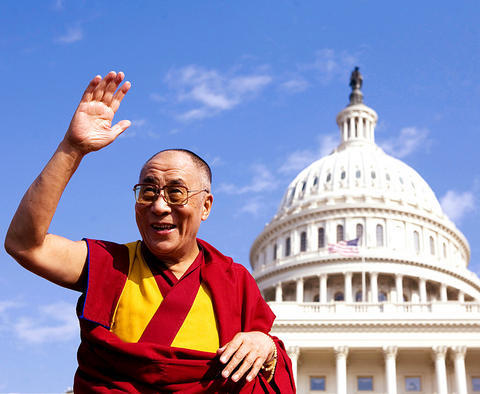China demanded yesterday that the US correct "its erroneous act" of honoring the Dalai Lama, saying the move seriously undermined relations between the countries.
US President George W. Bush presented Tibet's exiled spiritual leader with the US Congress' highest civilian honor on Wednesday and urged Chinese leaders to welcome him to Beijing.
"The move of the United States is a blatant interference with China's internal affairs which has severely hurt the feelings of the Chinese people and gravely undermined the relations between China and the United States," Chinese Foreign Ministry spokesman Liu Jianchao (劉建超) told a regular news briefing.

PHOTO: AFP
He said Chinese Foreign Minister Yang Jiechi (楊潔箎) had summoned US Ambassador Clark Randt to express a "strong protest to the US government."
"China urges the United States to take effective measures immediately to remove the terrible impact of its erroneous act, cease supporting and conniving with the separatist activities of the Tibet independence forces ... and take concrete steps to protect China-US relations," Liu said.
Beijing has warned that giving the award to a person it believes is trying to split the country would have serious consequences, but Liu refused to say what China would do.
"The US is fully aware of what kind of actions will benefit China-US relations," Liu said.
Bush praised a man he called a "universal symbol of peace and tolerance, a shepherd of the faithful and a keeper of the flame for his people."
"Americans cannot look to the plight of the religiously oppressed and close our eyes or turn away," Bush said at the US Capitol building, where he handed the Dalai Lama the prestigious Congressional Gold Medal.
The Dalai Lama is lauded worldwide as a figure of moral authority, but China reviles him as a separatist and has vehemently protested the elaborate public ceremony.
The 72-year-old monk and 1989 Nobel Peace Prize laureate says he wants "real autonomy" for Tibet, not independence.
Bush said he did not think his attendance at the ceremony would damage relations with China.
"I support religious freedom; he supports religious freedom ... I want to honor this man," Bush told reporters at the White House. "I have consistently told the Chinese that religious freedom is in their nation's interest."
Bush wants to ease anger in China, which the US needs to manage nuclear standoffs with Iran and North Korea. He also wants to be seen as a champion of religious freedom and human rights.
Liu rejected Bush's suggestion that China welcome the Dalai Lama to Beijing.
"How China is going to deal with the Dalai Lama issue and the Tibetan issue is the internal affairs of China. Chinese people know better than anybody and we do not want other people telling us how to do that," he said.
During the award ceremony in Washington the Dalai Lama said he hoped the upcoming Beijing Olympics would make China more open and tolerant. Liu refused to directly answer a reporter's question of how China would deal with political activists during the event next summer.
"We hope the people from the world who love the Games will make this event a success to strengthen friendship and understanding," he said.

The CIA has a message for Chinese government officials worried about their place in Chinese President Xi Jinping’s (習近平) government: Come work with us. The agency released two Mandarin-language videos on social media on Thursday inviting disgruntled officials to contact the CIA. The recruitment videos posted on YouTube and X racked up more than 5 million views combined in their first day. The outreach comes as CIA Director John Ratcliffe has vowed to boost the agency’s use of intelligence from human sources and its focus on China, which has recently targeted US officials with its own espionage operations. The videos are “aimed at

STEADFAST FRIEND: The bills encourage increased Taiwan-US engagement and address China’s distortion of UN Resolution 2758 to isolate Taiwan internationally The Presidential Office yesterday thanked the US House of Representatives for unanimously passing two Taiwan-related bills highlighting its solid support for Taiwan’s democracy and global participation, and for deepening bilateral relations. One of the bills, the Taiwan Assurance Implementation Act, requires the US Department of State to periodically review its guidelines for engagement with Taiwan, and report to the US Congress on the guidelines and plans to lift self-imposed limitations on US-Taiwan engagement. The other bill is the Taiwan International Solidarity Act, which clarifies that UN Resolution 2758 does not address the issue of the representation of Taiwan or its people in

US Indo-Pacific Commander Admiral Samuel Paparo on Friday expressed concern over the rate at which China is diversifying its military exercises, the Financial Times (FT) reported on Saturday. “The rates of change on the depth and breadth of their exercises is the one non-linear effect that I’ve seen in the last year that wakes me up at night or keeps me up at night,” Paparo was quoted by FT as saying while attending the annual Sedona Forum at the McCain Institute in Arizona. Paparo also expressed concern over the speed with which China was expanding its military. While the US

SHIFT: Taiwan’s better-than-expected first-quarter GDP and signs of weakness in the US have driven global capital back to emerging markets, the central bank head said The central bank yesterday blamed market speculation for the steep rise in the local currency, and urged exporters and financial institutions to stay calm and stop panic sell-offs to avoid hurting their own profitability. The nation’s top monetary policymaker said that it would step in, if necessary, to maintain order and stability in the foreign exchange market. The remarks came as the NT dollar yesterday closed up NT$0.919 to NT$30.145 against the US dollar in Taipei trading, after rising as high as NT$29.59 in intraday trading. The local currency has surged 5.85 percent against the greenback over the past two sessions, central